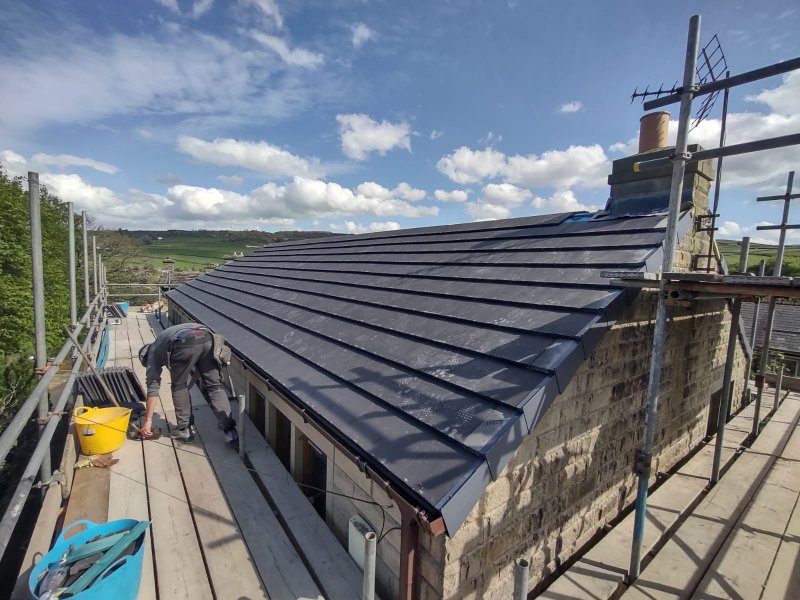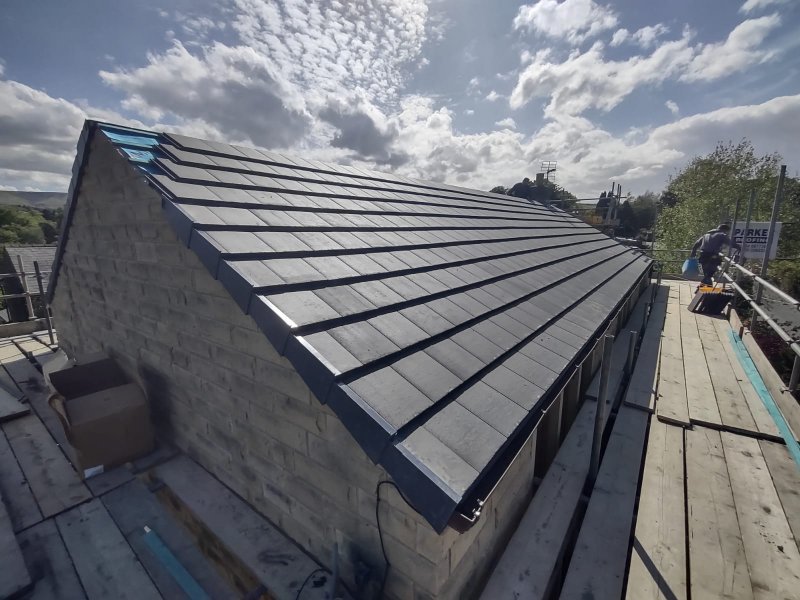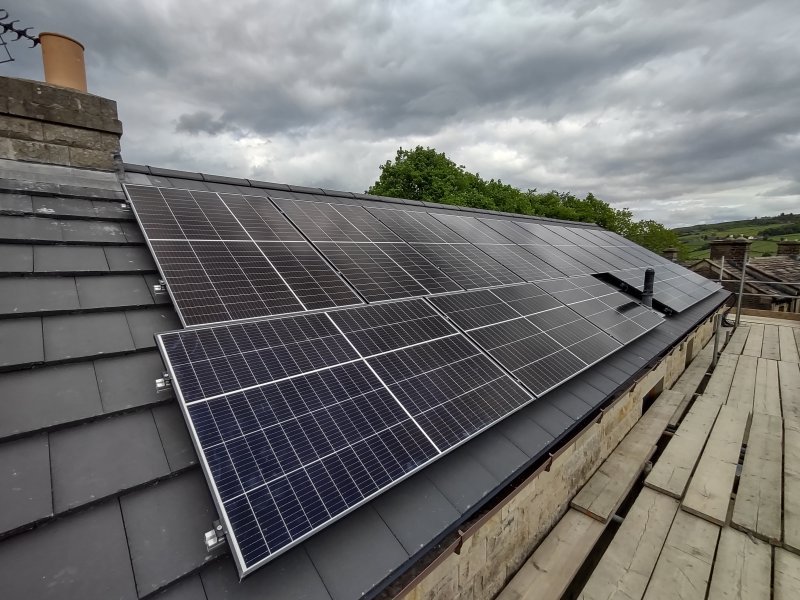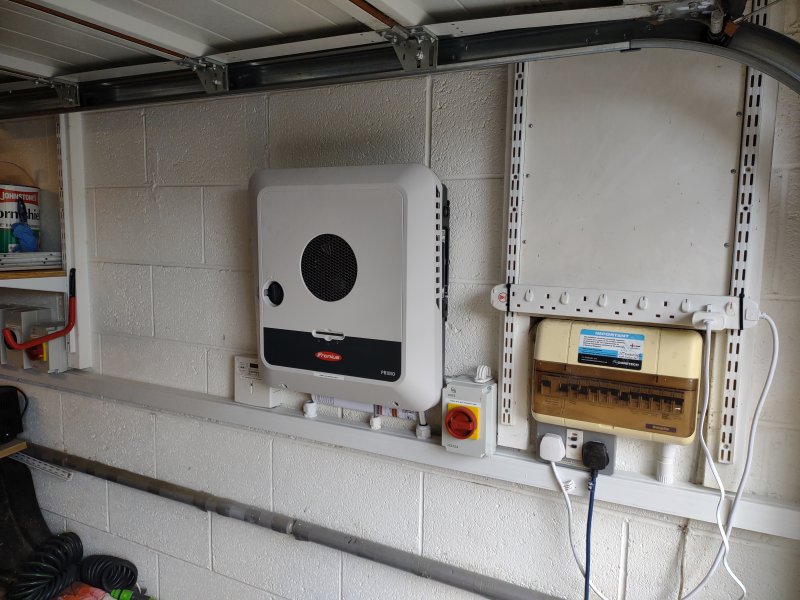You are using an out of date browser. It may not display this or other websites correctly.
You should upgrade or use an alternative browser.
You should upgrade or use an alternative browser.
In roof solar panels for roof tile repair/replacement
- Thread starter mjheathcote
- Start date
mjheathcote
Centenary Club
- Messages
- 9,037
Had quote for new roof today. Incl. Vat.
£11k for dark grey concrete tiles
£13k for repro stone tiles
£15k+ for brazilian slate.
Never having repro stone tiles again so that's out.
House down the road has the Brazilian slate, looks stunning.
However, you can't see our roof!
From our drive, and garden, you see our gable ends, and you can only see the North roof when standing across the road, just, as our house is elevated from the road level. Can't see the south unless standing in the neighbours garden.
He suggests the dark grey concrete tiles, which will have a far greater life than the repro stone tiles. Will see us out. We aren't on an estate so all the houses around us are different, mostly natural stone like ours, all have a mixture of roof types.
Currently getting quotes for solar from local companies.
They might be a saving if inbuilt on roofing cost, not sure...
£11k for dark grey concrete tiles
£13k for repro stone tiles
£15k+ for brazilian slate.
Never having repro stone tiles again so that's out.
House down the road has the Brazilian slate, looks stunning.
However, you can't see our roof!
From our drive, and garden, you see our gable ends, and you can only see the North roof when standing across the road, just, as our house is elevated from the road level. Can't see the south unless standing in the neighbours garden.
He suggests the dark grey concrete tiles, which will have a far greater life than the repro stone tiles. Will see us out. We aren't on an estate so all the houses around us are different, mostly natural stone like ours, all have a mixture of roof types.
Currently getting quotes for solar from local companies.
They might be a saving if inbuilt on roofing cost, not sure...
sionie1
Member
- Messages
- 1,316
Our roofer wouldn't touch Brazilian slate with a long stick, nor Chinese, really poor quality and shales/delaminates well within it's so called life. Watch out for quartz crystals in a lot of the foreign slates, these fall out shortening the life of the tile. Some new seams of Spanish are really good, nearly on par with Welsh slate, have you looked at Welsh reclaimed? It'll still be pricy but well sourced it'll last. Having said that every roofer has a preference but there's an interesting quote on a building web page:
Chinese and Brazilian varieties typically come at a lower cost. However, they have a very different mineral content to UK slate, which affects the performance of the tiles. “These slates are not suitable for some areas in the UK, mainly coastal regions, due to severe weather conditions,” says Rosie Connor, a director at JRC Specialist Slate Suppliers
What about grey clay tiles? Dreadnought, Marley do some nice ones. It's a dilemma choosing what to replace with - I've just done our rental, 1920's, and had wanted to keep the originality so had to do the research and do pricing myself to find the best deals. Good luck.
Chinese and Brazilian varieties typically come at a lower cost. However, they have a very different mineral content to UK slate, which affects the performance of the tiles. “These slates are not suitable for some areas in the UK, mainly coastal regions, due to severe weather conditions,” says Rosie Connor, a director at JRC Specialist Slate Suppliers
What about grey clay tiles? Dreadnought, Marley do some nice ones. It's a dilemma choosing what to replace with - I've just done our rental, 1920's, and had wanted to keep the originality so had to do the research and do pricing myself to find the best deals. Good luck.
mjheathcote
Centenary Club
- Messages
- 9,037
Old roof removed, and new roof 90% fitted today.
The roofer had 3 work gangs on the job, only the ridge tiles left and our small porch roof tomorrow.
Also decided to go for broke on a 16x400w (6.4Kw) solar system with hybrid inverter. This is the maximum possible on the whole south roof. The option for batteries can follow, I know it's not utilising all that solar without, but I'm now broke!
Decided now or never, with scaffolding up, new roof, electricity costs up, 0% VAT.


The roofer had 3 work gangs on the job, only the ridge tiles left and our small porch roof tomorrow.
Also decided to go for broke on a 16x400w (6.4Kw) solar system with hybrid inverter. This is the maximum possible on the whole south roof. The option for batteries can follow, I know it's not utilising all that solar without, but I'm now broke!
Decided now or never, with scaffolding up, new roof, electricity costs up, 0% VAT.


mjheathcote
Centenary Club
- Messages
- 9,037
Can I ask how much the solar cost? Looking to do something very similar when we extend up over the garage next year…. A solar company told us only to go to 3kw but Im thinking of future proofing
Approx £9.5k with no battery, and no scaffolding (already up).
The solar panels are £2.3k and the hybrid inverter £2.2k
The rest is the mounting frames over 1K, then all the cables, monitoring stuff, installation etc.
So was surprised that the actual panels themselves not that expensive.
Couldn't see the point of a smaller system, the calcs indicate it should generate 5651 kWh a year. Currently we use 6640 kWh a year.
Of course without a battery we will loose a chunk, and get a bit back on feed in tariff we can't use.
Future plan will be adding hot water storage to our combi. Fortunately we have a fancy Danish boiler that this can be added, so will reduce gas hot water heating costs.
Then the Mrs new plug in hybrid can take some.
Working from home, so dishwasher, washing machine etc during the day.
Then possibly battery storage but this is still very expensive really at £5k for a 7.68Kwh system.
It was really a now or never, can't see the costs getting cheaper when a chunk is actually installation, and can we see electricity prices coming down?
sionie1
Member
- Messages
- 1,316
Goes to show it’s the add ons that Mount up! the hybrid inverter is a chunk…
Factoring in the plug in hybrid is a good shout, my next company car will almost certainly be electric, full or hybrid will depend on whats available next year. I’d wanted a battery, but at those prices might do the same and wait a little and add later.
Factoring in the plug in hybrid is a good shout, my next company car will almost certainly be electric, full or hybrid will depend on whats available next year. I’d wanted a battery, but at those prices might do the same and wait a little and add later.
mjheathcote
Centenary Club
- Messages
- 9,037
Fronius GEN24 PlusWhat make is the inverter
The above a hybrid so batteries can be added later.
Discovered today a smaller 'slave' Fronius inverter is also part of the inverter cost package due to the size of the system.
UlstermanAbroad
Member
- Messages
- 1,687
Yeh. Imagine Greta appearing on your doorstep, giving you the Greta thousand yard stare. Saying nothing. Just the stare. Gives me the shivers just thinking about it.Go for it, you'll get pittance of a feed-in-tarrif but if you have to retire the roof in standard slate you might as well go for the PV slate. Energy prices will only go one way and you'll sleep better knowing that Greta doesn't hate you.
mjheathcote
Centenary Club
- Messages
- 9,037
Swedish Paul
Member
- Messages
- 1,809
I can see the headline now.Solar installation on roof complete, just a bit of field wiring and second slave inverter to fit in the garage to complete
Once the scaffolding is gone, no one can see it , unless you are flying into Manchester.
View attachment 100521
View attachment 100522
“Pilot blinded by glare off solar panels!!”
All makes sense, we make about 3200 kwh pa of a 4kw system. The battery will help a lot as solar PV produces little in the four months of the year when your demand is highest. Ditto in the summer when most of us use little during the peak hours of sunshine.Approx £9.5k with no battery, and no scaffolding (already up).
The solar panels are £2.3k and the hybrid inverter £2.2k
The rest is the mounting frames over 1K, then all the cables, monitoring stuff, installation etc.
So was surprised that the actual panels themselves not that expensive.
Couldn't see the point of a smaller system, the calcs indicate it should generate 5651 kWh a year. Currently we use 6640 kWh a year.
Of course without a battery we will loose a chunk, and get a bit back on feed in tariff we can't use.
Future plan will be adding hot water storage to our combi. Fortunately we have a fancy Danish boiler that this can be added, so will reduce gas hot water heating costs.
Then the Mrs new plug in hybrid can take some.
Working from home, so dishwasher, washing machine etc during the day.
Then possibly battery storage but this is still very expensive really at £5k for a 7.68Kwh system.
It was really a now or never, can't see the costs getting cheaper when a chunk is actually installation, and can we see electricity prices coming down?
I use more than my system generates even in summer but the battery appeals largely as a way of coping with rural power cuts and future EV charging as you say.
CatmanV2
Member
- Messages
- 48,734
All makes sense, we make about 3200 kwh pa of a 4kw system. The battery will help a lot as solar PV produces little in the four months of the year when your demand is highest
Curious: How big is the battery in terms of days to run the house?
C
mjheathcote
Centenary Club
- Messages
- 9,037
All makes sense, we make about 3200 kwh pa of a 4kw system. The battery will help a lot as solar PV produces little in the four months of the year when your demand is highest. Ditto in the summer when most of us use little during the peak hours of sunshine.
I use more than my system generates even in summer but the battery appeals largely as a way of coping with rural power cuts and future EV charging as you say.
Fortunately it is rare for the house to be empty during the day either myself, the Mrs will be at home. So dishwasher/washing machine etc can be used using peak daylight hours. We only cook via electricity in the summer, and not via electricity in the winter, via gas when the Aga is on, so no electric drying either in the winter.
So our electric usage is higher in the summer, should work to our advantage.
I'm sure a battery will follow however once we can establish where our usage goes once we start monitoring.
I’ve wondered that and how you wire it up with preferences. For me I would want it to fire my boilers and hot water/downstairs heating pumps and then kitchen sockets but that might be too bespoke. Alternatively I presume that it just feeds into your system and you need to turn off what you don’t need?Curious: How big is the battery in terms of days to run the house?
C
zagatoes30
Member
- Messages
- 20,908
I’ve wondered that and how you wire it up with preferences. For me I would want it to fire my boilers and hot water/downstairs heating pumps and then kitchen sockets but that might be too bespoke. Alternatively I presume that it just feeds into your system and you need to turn off what you don’t need?
That would be my logic too, being in rural Ireland power outages are not uncommon, probably once every couple of months for anywhere between 2 and 8 hours so something that could provide basic power in those periods would be a big win here.
Tallman
Member
- Messages
- 1,833
In general if you go solar they advise you to get solar water heaters and gas cooking as those are two large electricity consumers so ideally you need to take those “off grid”. You would need a huge battery system to be able to run the house plus heating plus cooking.That would be my logic too, being in rural Ireland power outages are not uncommon, probably once every couple of months for anywhere between 2 and 8 hours so something that could provide basic power in those periods would be a big win here.
We have regular “load shedding” which means we get cut off for 2.5 hours up to 3-4 times per day and with my 20 250W panels and 16 Lead acid batteries (10KWh practical capacity) we can manage that as the batteries charge up after each 2.5 hrs cut off if it’s at night. During the day the solar system will hack it with only very limited battery use if we time the washing machine/dryer/pool pump. Lithium batteries are the way to go now as they have many more charge cycles and also you can run them down to 10% whereas Lead Acid batteries should not be used below 50% charge if you want them to last. Also panel capacity has more than doubled to ~600W so you can get away with less panels (or bigger capacity on the same area).
zagatoes30
Member
- Messages
- 20,908
In general if you go solar they advise you to get solar water heaters and gas cooking as those are two large electricity consumers so ideally you need to take those “off grid”. You would need a huge battery system to be able to run the house plus heating plus cooking.
We have regular “load shedding” which means we get cut off for 2.5 hours up to 3-4 times per day and with my 20 250W panels and 16 Lead acid batteries (10KWh practical capacity) we can manage that as the batteries charge up after each 2.5 hrs cut off if it’s at night. During the day the solar system will hack it with only very limited battery use if we time the washing machine/dryer/pool pump. Lithium batteries are the way to go now as they have many more charge cycles and also you can run them down to 10% whereas Lead Acid batteries should not be used below 50% charge if you want them to last. Also panel capacity has more than doubled to ~600W so you can get away with less panels (or bigger capacity on the same area).
No mains gas option here so that's not an option, only looking to maintain the basic light and power heating and cooking we can do without for the short periods involved




